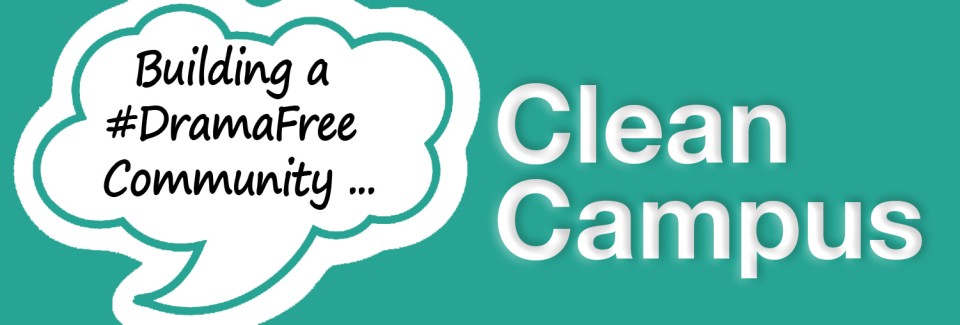Building a #DramaFree Community
by Caitlin Walker in

At Clean Learning, we endeavour to be an example of the skills and tools we teach. So we do a Clean Set Up before we train together and before meetings. And when we have conflict or get into drama, we recognise our own patterns and lean into one another to separate evidence from inference and work towards either clarifying expectations, collaborating, or setting our own personal and professional boundaries. We believe that what we teach is of great value to the world, and we want to ensure that we are benefiting from creating the kinds of communities that we help others to create in their offices, organisations, schools and communities. We’d love to say that this was easy, but like any great practice it takes diligence and perseverance.
A great resource in developing clean practices is having peers who can help you. To this end, we have created the Clean Campus, a broad learning community for anyone interested in creating a #DramaFree* culture within their own individual system and across systems of diverse individuals. Within the Clean Campus, you can join peer practice groups, start discussions, ask questions, and share ideas and resources. If you're familiar with the #DramaFree tools, including separating evidence and inference, moving from problem to outcome, asking clean clarifying questions, and designing developmental tasks, you'll see many of them used / mentioned within the discussion threads. It's free to join, so we hope you'll join us there.
De-escalating online drama
Something that can easily escalate into drama is online discussion on social media, where we can lose sight of there being a real human being at the other end of the comments we read and leave. One way people get hooked into drama is by reading comments that rescue one group by persecuting another. This is an old tactic used by those in our communities who like to pedal hate. But in recent years, many of us have jumped on these bandwagons and either shared inflammatory posts or criticised comments, backing ourselves into our own preconceived corners with neither side learning very much.
I have been experimenting with how to de-escalate online drama and re-engage in empathy and understanding. Something I do is ask myself questions, before I start typing, to settle my own system. For example, I might imagine the person who’s written the comment as someone I know and care about. Then I ask myself, "I wonder what’s really important to them? I wonder how their ideas fit into their wider philosophy about how communities work?"
When a friend posted a drama-inducing anti-vaccination post, with inaccuracies and citing unfound sources, rather than call them out for misinformation, I enquired into their wider view of community health and we had a very enlightening discussion around the direction that public health had been going in terms of valuing vaccinations and antibiotics, rather than focusing on holistic community health and wellbeing, both for farm animals and for humans. This kind of encounters can take more time than a couple of pithy sentences about what somebody else is doing wrong in my eyes, but the rewards are not just personal growth, but also being a part of creating more empathic, connected communities. And that’s well worth it from our perspective.

Help! I’m in drama … get me out of here!
If you find yourself in drama (holding someone or some group or even yourself) in contempt, there are a few easy steps to loosen the drama and to get you more curious and connected.
Step 1: Detect when you’re in drama
- Notice when someone is outside of your sphere of respect.
- Notice if you’re trying to recruit people to your point of view against somebody else.
- Be especially alert for when you think you’re helping somebody else or saving them from themselves. The rescuing position can make you feel good about yourself and blind you to the contempt you’re holding for others.
- Knowing your own drama metaphor can help with this step: When you’re in drama you’re like what?
Step 2: Ask yourself, “What actually happened?”
- When we’re having a reaction to something / someone, it’s easy to imagine that we ‘know’ what happened, we ‘know’ the other person’s intention, and we ‘know’ they meant to hurt us in some way. More often than not, this is just not true.
- Take time to separate what happened into three categories: (1) EVIDENCE: What actually happened – what did you see or hear? (2) INFERENCE: What are you making up or inferring about what happened? (3) IMPACT: What impact is this having on you? (Hint: the impact is often caused by our inferences rather than by what actually happened.)
Step 3: Ask yourself, “What would I like to have happen?”
- By the time you’ve detected you’re in drama and then separated it into evidence, inference and impact, you may have calmed down sufficiently to figure out your next step. If not, have a good think about what you want before taking any action.
- Ask yourself some clean questions about your outcome to flesh it out a bit.
- If you decide to offer some feedback to someone, you can use the work you did in Step 2 to help you to formulate your feedback, and then you can use your thinking around what you want to make a request of them.
Step 4: Listen and be curious
- Engaging in this kind of dialogue (rather than burying your head in the sand and feeling resentful) can mean you start getting feedback from others.
- When you’ve given your feedback, be prepared to listen to what comes back and be curious about what they say. What can you learn about yourself from this interaction?
- The feedback we give often says a lot more about us than those we’re giving it to. Most of the time there is no evil intention, it’s just a misunderstanding and it’s something in us that means we’ve been triggered. But that doesn’t mean that there can’t be precious learning points for us when someone gives us feedback. It’s always worth having a clean or clean-ish dialogue so you can both learn more.
Of course, drama is often a lot more complex than these four steps imply. If you receive an email from a generally supportive colleague that triggers a bit of drama in you, that’s a different matter to having yet another row with a sibling over a parent’s care, discovering that your child is being bullied at school, or being in drama with yourself for not having achieved what you wanted in your life so far. So, if you’d like to explore your own dramas and triggers in more depth, and find your own ways of dealing with them, all within a supportive group, you might like to join us for a Creating #DramaFree Conversations event.
*Svetlana Shapovaliants came up with the description #DramaFree for the work of Clean Language and Systemic Modelling.
Related blog posts
Why would I want to be #DramaFree?
19th Jan 2022
How to Turn Your Life into a #DramaFree Zone [1]
27th Sep 2018
#DramaFree Goes to Church
11th Nov 2018
Related courses
About Caitlin Walker
Caitlin is a director of Clean Learning and the developer of Systemic Modelling™. She is the author of From Contempt to Curiosity, which details many of the innovative and transformational projects she’s led across our community from the most dispossessed to leading think tanks.
Caitlin graduated in Linguistics at the School of Oriental and African Studies and completed four years post graduate research in ‘Strategies for Lexical access’ including fieldwork in Ghana. She began modelling teaching and learning while at SOAS, volunteering intermediary classes to translate information presented at lectures into different learning styles for the students. At the same time she was a youth worker in Kings Cross bringing these leading edge tools to groups of young people.
She went on to set up literacy clubs in King’s Cross, where children could come to learn to spell. From 1996 – 1999 Caitlin was an Education tutor with the Dalston Youth Project, a Home Office run experiment to offer accelerated learning to at-risk students, alongside mentoring, to keep them in school. She ran these sessions as NLP modelling workshops and achieved excellent results with the students. The project won a Crime Prevention and Community Safety award for Great Britain. In 1999 she was offered the opportunity to develop her work in a business context and she created the ground breaking metaphors@work process. These techniques are available on the Creative Management section of the Open University MBA program and on a 10 week modular course on Practical Thinking. She has co-designed and she co-delivers a Masters Level module in Coaching and Mentoring at Liverpool John Moores University.
She has since developed her modelling skills from small scale group development to whole scale organisational culture change programmes. She designs and delivers tailor made learning and development programs for addressing diversity, conflict, leadership, managing mergers and creating ‘learning organisations’.
Caitlin practices in a variety of contexts. Clients include: Jeyes Group, Liverpool John Moores University, Pharmacia, Hull City Council, South Yorkshire Police Service, Bexley Care Trust, New Information Paradigms, Work Directions UK, Crime Concern, BT, Police National Search Centre, Celerent Consultancy, Carbon Partners, Ealing LEA, and Working Links. She has trained a number of in-house trainers to carry on and develop the work without creating dependency on her expertise. She has systematically tested and developed her ideas in challenging arenas and her robust products have become sought after learning aids.
- Blog categories
- A - Z of Clean
- Adventures in Clean
- Book Reviews
- Business
- Clean Ambassadors
- Clean Interviewing
- Clean is like ...
- Clean Language
- Clean Language Questions
- Clean Space
- Client Stories
- Coaching
- Creativity
- #DramaFree
- Education
- Health
- ICF
- Life Purpose
- Listening
- Metaphor
- Modelling
- Outcomes
- Practice Group
- Symbolic Modelling
- Systemic Modelling
- Training


